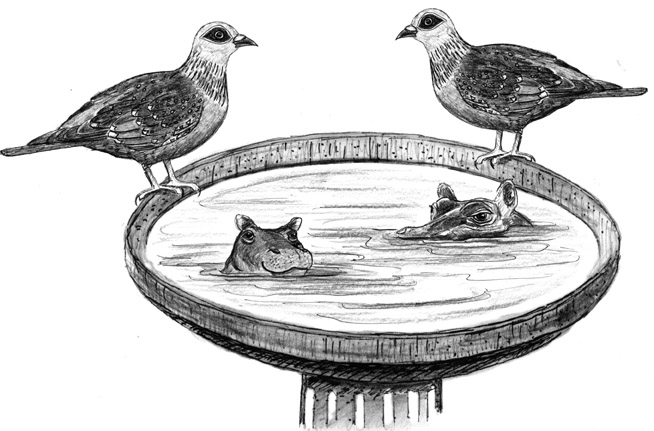
Dear Bird Folks,
I spend a lot of time watching birds in our garden. I put out food every morning and get a huge assortment of birds. The list includes lots of Cape Weavers, Rock Pigeons, Cape Turtle Doves, plus the occasional chat, wagtail and bullfinch. After eating their fill, the weavers jump into my birdbath where they drink and splash around, but the pigeons and doves never go into the bath. They sometimes drink, but never bathe. Is that normal?
– Kitty (age 95), South Africa
I love South Chatham, Kitty,
The houses have that classic Cape Cod look and the shops are all filled with gooey saltwater taffy. But what I really like about South Chatham is…wait! Did you say you are from “South Africa”? Not South Chatham? But you said you had Cape Weavers and Cape Turtle Doves. Is there really more than one Cape? When did that happen? Does South Africa have saltwater taffy? According to my Fodor’s guide, your shops are all filled with something called “melktert” and buttermilk beskuits.” I don’t know what those items are, but they have to be better than saltwater taffy. The fillings come out of my teeth just thinking about that sweet gluey stuff. But we can talk about snacks later; let’s get back to birds.
It’s good to know that people feed birds in South Africa. That will give me a place to set up shop if they ever run me off Cape Cod, which sometimes seems like it could happen at any minute. I can imagine the questions an African bird store owner would have to listen to. People would ask: “How do I keep the lions out of my feeder?” (Suddenly, squirrels wouldn’t seem so bad.) But honestly, I thought your feeders would have more interesting birds than weavers, pigeons and doves. Where are the secretary birds, the ostriches, and the bustards? (I know you aren’t likely to see “bustards” in your backyard, but I just wanted to make the newspaper’s editor nervous.) Before I answer your question, I think you should know that I’m not really the world’s leading authority on African avifauna. In fact, the closest I’ve ever been to Africa was the time I visited Disney’s Animal Kingdom Park. And even then I spent the whole time in the gift shop. (Once a retailer, always a retailer.)
Let’s begin with Rock Pigeons. It seems you aren’t the first person to wonder about pigeons’ bathing habits. I found a clip on YouTube in which a woman, who raises pigeons, was also asked this same question. The Pigeon Lady responded to this burning issue by performing an experiment. She placed a shallow pan in her pigeon pen, filled it with water and stood back. Immediately the birds descended on the pan and started splashing like little kids in a city pool. The more they splashed, the more other pigeons joined in. So, based on this video, the answer to your question is, no, it is not “normal” for Rock Pigeons to not use a birdbath. (I know I have a lot of negatives in that sentence, but I think they all even out.) Unfortunately, there’s a problem with the experiment. The Rock Pigeons the lady tested were your basic, standard-issue city pigeons. But in Africa, the Rock Pigeon is also known as the Speckled Pigeon, and that’s a totally different bird. Speckled Pigeons are prettier than city pigeons. They have white spots on their backs, ruffles in their necks and freaky bright red patches around their eyes, making them look like a cross between zombies and the parents of a newborn. I know for sure that our pigeons enjoy a nice bath and I suspect the same thing applies to your pigeons, but I’m not totally positive. So let’s put that down as a maybe and move on to doves.
To find out if Cape Turtle Doves bathe in water, I contacted my friends at the Cincinnati Zoo (which means I punched up the zoo’s website). According to the zoo, Cape Turtle Doves do indeed bathe in shallow water. In addition to water, these doves also take dust baths and sunbaths. Taking a bath in dirt sounds counterproductive, but fine dirt helps absorb some of the birds’ excess natural oil and may also assist in ridding them of annoying mites. Like people at the beach, doves also enjoy stretching out in the warm sun. They typically spread their feathers out along the ground or lift one wing high in the air, as if they’re hailing a cab. It is thought sunbathing helps the molting process and possibly with mite control as well. However, it doesn’t explain why some humans lie on the beach. Perhaps they have their own mite issues. In addition to using water, dust and sun, doves also keep their feathers in shape by constant preening with their own natural “powder down.” Powder down is a fine talc-like substance the doves produce to help waterproof their feathers. (It’s also the stuff that leaves a ghostly dove-imprint on a window when a bird accidently hits it.)
I suspect the doves and pigeons you see in your garden do occasionally take baths, Kitty, but I can’t really say why they don’t use your birdbath. Although, it wouldn’t hurt to check your bath for submerged hippos. I know I wouldn’t want to swim in a bath with hungry, hungry hippos. Better yet, maybe I should take a trip to South Africa and check out things in person. Then you and I could go out for some melktert and buttermilk beskuits. (I promise I won’t make you eat any saltwater taffy.) And if I open a birding store, you could run it for me. We’d just have to be careful what we name the store. I don’t think “Kitty’s Bird Store” would sit too well with the birds.